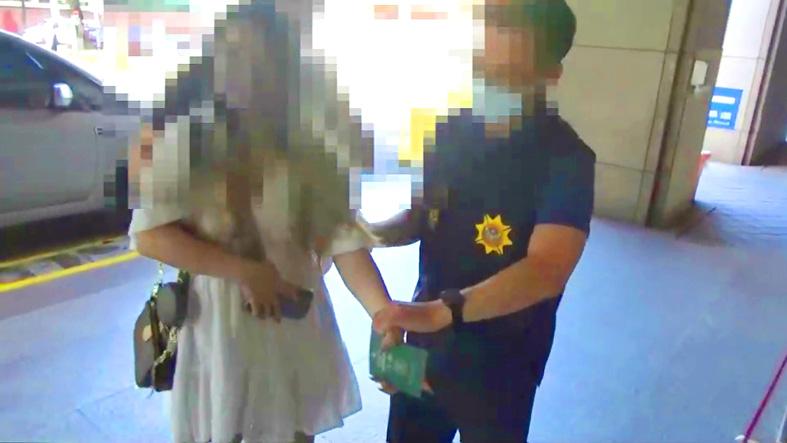Nine people were arrested in separate raids on Monday for allegedly colluding with foreign human trafficking syndicates and duping Taiwanese jobseekers into becoming “cyberslaves” in Cambodia.
Cyberslavery refers to people being enslaved and forced to work for syndicates involved in cyberscams.
Police in Changhua County said the 41-year-old female suspect, surnamed Chang (張), has been detained on suspicion of working with a Chinese human trafficking ring, and is alleged to have sent 50 Taiwanese over a five-month period to Cambodia, after posting adverts online promising high-paying jobs.

Photo: CNA
Prosecutors said that Chang lead the ring’s Taiwan operations and was paid NT$5 million (US$166,772) in total, as she received commission of NT$100,000 per person.
Police arrested two men, along with Chang, in Monday’s raids. They allegedly worked for her as a driver and guard, and have been released.
Investigators said Chang paid for the victims’ flights and helped them apply for new passports,while the driver took them to a hotel a few days before departure, and the guard watched over them at the hotel and airport to ensure they did not back out.
Changhua District Court Judge Huang Ling-yu (黃齡玉) said one victim managed to escape and returned to Taiwan.
He said he was deceived by Chang’s advertisement offering word processing and desk jobs in Europe that paid NT$100,000 per month, but later learned the job was in Cambodia, Huang said.
During the raids five Taiwanese were found, Huang said, adding that they were staying in a hotel, waiting to travel to their “high-paying jobs.”
Meanwhile, police in Hsinchu City detained six people after questioning yesterday, on suspicion of working with a Chinese human trafficking ring.
The case came to light after a traffic incident that led to a scuffle in the street. Police sought out a man surnamed Ho (何) and his friends, as they were allegedly involved in the fight. They found a 21-year-old woman trapped in Ho’s rented apartment who had bruises on her body.
She said she had answered an online ad offering a high-paying job overseas, and was confined and beaten up when she wanted to leave.
Investigators found that Ho and five accomplices — four men and one woman — had colluded with human trafficking rings in China, placing job offers and then sending people to Cambodia and Thailand, Hsinchu City Chief of Police Kuo Shih-chieh (郭士傑) said.
Ho and his accomplices are facing charges of assault, illegal confinement and abduction, and of breaching the Human Trafficking Prevention Act (人口販運防制法).
All six were denied bail.
Kuo said the 21-year-old woman was supposed to board a flight for a job in Thailand, but would likely have become a cyberslave for a telecom scam ring.
“We are working hard to crack down on these criminals ... who are collaborating in the serious crime of human trafficking, resulting in Taiwanese citizens becoming slaves, confined in prison-like conditions currently centered in Chinese-operated casinos and resorts in Sihanoukville, Cambodia,” Kuo said.
“We urge Taiwanese to research the details of job offers, especially those promising high wages overseas. It is most certainly a deception,” Kuo said.

‘DENIAL DEFENSE’: The US would increase its military presence with uncrewed ships, and submarines, while boosting defense in the Indo-Pacific, a Pete Hegseth memo said The US is reorienting its military strategy to focus primarily on deterring a potential Chinese invasion of Taiwan, a memo signed by US Secretary of Defense Pete Hegseth showed. The memo also called on Taiwan to increase its defense spending. The document, known as the “Interim National Defense Strategic Guidance,” was distributed this month and detailed the national defense plans of US President Donald Trump’s administration, an article in the Washington Post said on Saturday. It outlines how the US can prepare for a potential war with China and defend itself from threats in the “near abroad,” including Greenland and the Panama

A magnitude 4.9 earthquake struck off Tainan at 11:47am today, the Central Weather Administration (CWA) said. The hypocenter was 32.3km northeast of Tainan City Hall at a depth of 7.3km, CWA data showed. The intensity of the quake, which gauges the actual effect of a seismic event, measured 4 in Tainan and Chiayi County on Taiwan's seven-tier intensity scale, the data showed. The quake had an intensity of 3 in Chiayi City and County, and Yunlin County, while it was measured as 2 in Kaohsiung, Nantou County, Changhua County, Taitung County and offshore Penghu County, the data showed. There were no immediate reports of

The Chinese Nationalist Party (KMT) is maintaining close ties with Beijing, the Democratic Progressive Party (DPP) said yesterday, hours after a new round of Chinese military drills in the Taiwan Strait began. Political parties in a democracy have a responsibility to be loyal to the nation and defend its sovereignty, DPP spokesman Justin Wu (吳崢) told a news conference in Taipei. His comments came hours after Beijing announced via Chinese state media that the Chinese People’s Liberation Army’s Eastern Theater Command was holding large-scale drills simulating a multi-pronged attack on Taiwan. Contrary to the KMT’s claims that it is staunchly anti-communist, KMT Deputy

RESPONSE: The government would investigate incidents of Taiwanese entertainers in China promoting CCP propaganda online in contravention of the law, the source said Taiwanese entertainers living in China who are found to have contravened cross-strait regulations or collaborated with the Chinese Communist Party (CCP) could be subject to fines, a source said on Sunday. Several Taiwanese entertainers have posted on the social media platform Sina Weibo saying that Taiwan “must be returned” to China, and sharing news articles from Chinese state media. In response, the Mainland Affairs Council (MAC) has asked the Ministry of Culture to investigate whether the entertainers had contravened any laws, and asked for them to be questioned upon their return to Taiwan, an official familiar with the matter said. To curb repeated